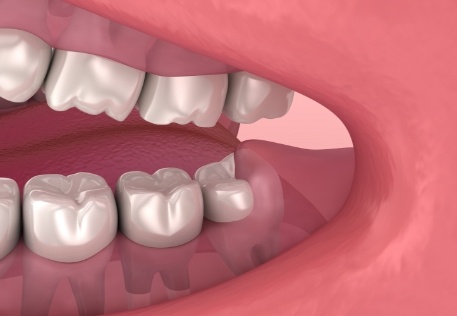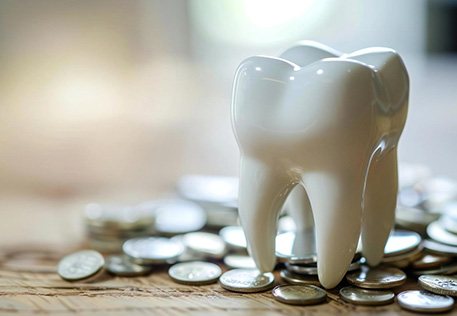Wisdom Tooth Extractions – Dallas, TX
Safe and Effective Tooth Removal
In most situations, the team at Mariya Barnett, DDS Family & Cosmetic Dentistry work hard to help patients keep their natural smiles, but there are cases where removing one or more teeth is the best option to maintain the optimal level of oral health. In these situations, we’ll recommend tooth extraction. The most commonly extracted teeth are the last to erupt from the gum line. This third set of molars called wisdom teeth are often removed because there is not enough space to accommodate them within the smile line. Skilled restorative dent ist, Dr. Mariya Barnett, offers safe, comfortable wisdom tooth extractions in our Dallas, TX dental office, and treatments to help patients fully restore their smiles after tooth loss. If you want to learn more about wisdom tooth removal or any of the other preventive, restorative, and cosmetic dentistry services available in our Dallas dental office, give our team a call. We’ll be happy to answer your questions or schedule a treatment consultation appointment.
Why Choose Mariya Barnett, DDS Family & Cosmetic Dentistry for Wisdom Tooth Extractions?
- Highly Experienced Dentist Dedicated to Your Comfort
- Modern Dental Office Equipped with Advanced Technology
- Sedation Options Available to Help Manage Anxiety
When We Recommend Wisdom Tooth Extraction

We recommend wisdom tooth extraction when it is the best way for patients to maintain healthy oral function. Some of the situations where wisdom tooth extraction may be unavoidable include:
- Impaction – tooth is unable to fully erupt from the gum line
- Crowding – there is not enough room for the additional teeth in the gum line
- Dental drift – surrounding teeth are moved out of position by the developing third molars
- Infection and decay – often occurs when wisdom teeth are impacted which can irritate and inflame the soft tissue and trap bacteria and plaque on the tooth’s surface leading to decay
How Wisdom Teeth are Removed

If your wisdom teeth are fully erupted from the gum line, we may be able to “pull” them. That involves using a metal clasp to shift the teeth back and forth until it breaks free from the socket. If the tooth is not fully erupted from the gum line or we are not able to pull the tooth free, surgical removal may be necessary. This can be as simple as cutting away a small amount of connective soft tissue or a much more complex procedure that requires us to break the tooth into numerous smaller pieces before cutting it away from the supportive bone and gum tissue.
What to Expect Following Tooth Extraction

Following wisdom tooth extraction, you may have some swelling, light bleeding, and discomfort. However, using pain relieving medications and ice packs as directed should allow you to maintain comfort as your extraction site heals. If you experience severe pain or sensitivity or your discomfort increases, you may be experiencing dry socket, infection, or other complications. Contact our team right away. We can walk you through first aid and pain management over the phone and schedule an appointment to see you in our dental office.
Understanding the Cost of Wisdom Tooth Extractions

One of the first questions many patients have when they learn they need to have wisdom teeth extracted is how much it will cost. Before we can provide detailed information, you must consult with Dr. Barnett so she can examine your current condition. Then, based on her findings, we’ll give you an estimate and walk you through the information for your approval before we proceed.
Continue reading to learn more about how the price of wisdom tooth extractions is determined, and feel free to contact us for additional information.
Factors That Can Impact the Cost of Wisdom Tooth Extractions
You might not pay the same exact amount as someone else for your wisdom tooth extractions. This is because the rate depends on several different factors that are unique to your situation, including:
- How many teeth must be removed. Some people grow 4 wisdom teeth (one for each quadrant of their mouths.) Others only have 1, 2, or 3.
- Whether they’re impacted. If your wisdom teeth are trapped in your gums, they have a soft-tissue impaction and must be surgically removed. If they’re caught in your jaw, your oral surgeon must perform a procedure to remove the bony impaction.
- Types of sedation needed. Whether you’re having a simple extraction or a surgical one, you may have to pay for additional anesthesia or sedatives for your procedure.
- The type of specialists required. A special surgeon might be necessary if your case is severe, which can incur a higher cost.
Does Dental Insurance Cover Wisdom Tooth Extractions?
Many dental insurance plans cover a portion of major procedures like wisdom tooth extractions, however there’s no guarantee. Also, there may be other stipulations you need to be aware of and meet before benefits kick in, like an annual deductible or a waiting period.
If you’re unsure what’s included in your plan, you can call your insurance provider directly or ask our friendly office staff for assistance. They are familiar with many policies and can help you maximize the benefits available to you.
How to Make Wisdom Tooth Extractions Affordable
Our team understands that not everyone carries dental insurance, and we don’t want your budget to keep you from the care you need to alleviate your pain and save your smile. If you’re concerned about the cost of your wisdom tooth extractions, you might benefit from one of the following options:
- Flexible financing. We’ve partnered with third-party financers, CareCredit and Lending Club, so you can break up your total invoice into more manageable installments that won’t break the bank if your application is approved.
- Mariya Barnett, DDS Family & Cosmetic Dentistry membership plan. For a low annual fee, this in-house membership includes free and discounted services without waiting periods, deductibles, or annual maximums.
Wisdom Tooth Extractions FAQs
Does Everyone Have Wisdom Teeth?
Surprisingly enough, the answer is no. The majority of people have four wisdom teeth, but some have fewer than that and others don’t have any. Studies indicate that anywhere between 5% and 37% of people have three or fewer wisdom teeth.
The exact reason why certain people don’t have wisdom teeth is not known. That said, it does seem to be a trait that can be passed on from parent to child.
Of course, it’s difficult to know for sure whether you have wisdom teeth since they don’t erupt until the late teens or early twenties. The best way to confirm the presence of wisdom teeth is to visit your dentist so that they can take an X-ray of your jaw.
How Should I Prepare for My Wisdom Tooth Extraction?
Our team will give you instructions on steps you’ll need to take to get ready for your wisdom tooth extraction. Here are some examples of things we might recommend:
- If sedation or anesthesia will be used, make sure you have a trusted friend or family member who can drive you to and from your appointment.
- Refrain from smoking for a certain amount of time prior to the procedure.
- If you plan on receiving IV sedation, remember to wear a shirt with short sleeves (or at least sleeves that can be rolled up easily) on the day of your treatment.
- Go to the grocery store and buy plenty of soft foods that you’ll be able to enjoy while your mouth is recovering from the extraction process.
Additional instructions may be given depending on the circumstances. Remember, if you have any questions or concerns, don’t be afraid to let us know; it pays to be as prepared as possible!
What’s the Best Age to Get Wisdom Teeth Removed?
There’s no upper age limit for wisdom tooth extraction. However, it’s generally better to have the procedure performed in your late teenage or early adult years. The wisdom teeth will become more embedded in your jaw as time passes; this means removing them will grow more difficult as you age. Additionally, it’s best to have potentially problematic wisdom teeth taken out as soon as possible before they can lead to cysts, dental damage, and other oral health complications.
How Do You Sleep After Wisdom Tooth Removal?
To make it easier to sleep after your wisdom tooth extraction, you’ll want to keep your discomfort under control by taking prescribed or over-the-counter pain medication. It can also help to hold a cold compress over the affected area for 20 minutes at a time.
When you lie down to go to sleep, rest your head on multiple pillows to keep it elevated. This will stop blood from rushing to your head and causing additional swelling and discomfort.
Be sure to take whatever steps you can to avoid dry socket, such as not using a straw and not touching the extraction site with your tongue. Dry socket can be very painful, which certainly won’t make getting to sleep any easier.
When Can I Use a Straw After Wisdom Teeth Removal?
Drinking through a straw creates a suction force that can dislodge the blood clot forming over the extraction site and causes dry socket. The exact length of time until you can use a straw again varies from patient to patient, but generally speaking, it is best to wait for at least three days. Your dentist will be able to give you a more precise, personalized recommendation based on your specific situation.
How Long Does Wisdom Tooth Surgery Take?
You will most likely receive sedation, so it will feel as if barely any time has passed at all. On average, it takes about 15 to 20 minutes to extract a wisdom tooth, so removing all four can take up to 90 minutes. The time it takes will vary depending on the tooth’s location, position, and whether it’s impacted. Your dentist will be able to give you a more specific estimate during your consultation so you can plan your surgery day accordingly.
Is Wisdom Tooth Removal Painful?
The first step of wisdom tooth surgery is always numbing your mouth with local anesthetic. You will most likely receive sedation, which limits your body’s ability to register pain. Therefore, you can expect your procedure to be entirely painless. You will probably experience some soreness for a few days afterward. By closely following your aftercare instructions, you should be feeling back to normal within a week.
Why Are Wisdom Teeth Called That?
Wisdom teeth don’t seem to be “wise” at all! They grow in at strange angles and seem to cause more harm than good. The theory is that since these teeth don’t emerge until early adulthood, a person is older than they were when the rest of their teeth erupted. With age comes wisdom – therefore they are called “wisdom teeth.”
I Need a Checkup & Cleaning I Need a Dentist for My Child I am Concerned About Bleeding Gums I Have a Cavity or Broken Tooth I am Missing One or More Teeth I Want to Enhance My Smile I Want a Straighter Smile I am Scared of the Dentist I am in Pain & Need Help I Have Pain in My Jaw I am Concerned About Sleep Apnea Therapy View Our Services






